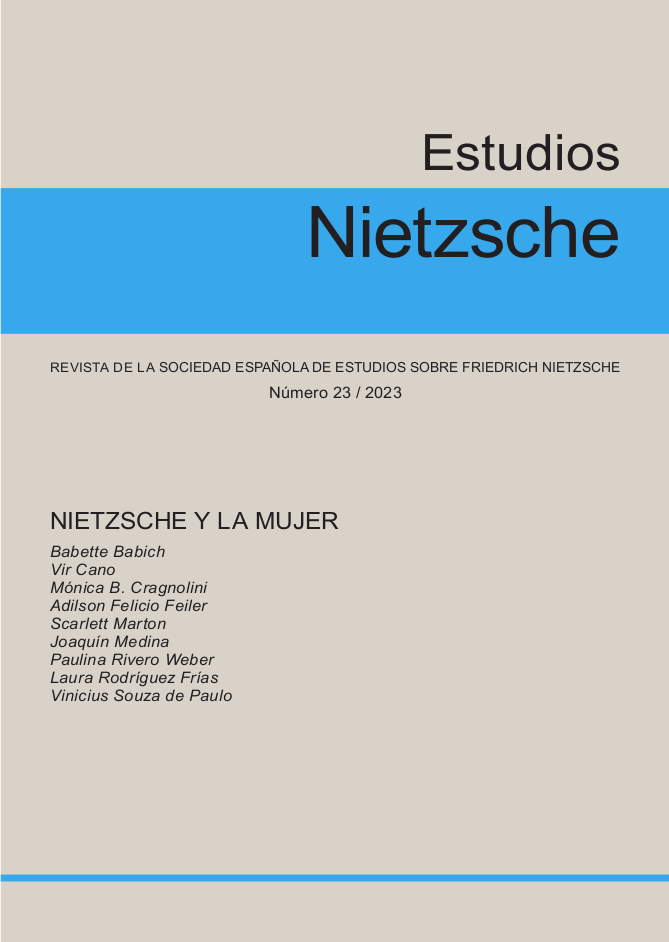Women who write books are dangerous. Nietzsche and women’s emancipation
DOI:
https://doi.org/10.24310/EstudiosNIETen.vi23.16056Keywords:
women's emancipation, equality, women writersAbstract
Examining the positions that Nietzsche assumes in relation to French women writers and especially to George Sand, Madame de Staël and Madame Roland, will be the starting point of our investigation. From the analysis of Nietzsche's texts on this subject, we count, at first, to clarify the assumptions from which he starts. We then want to show that, far from occupying a marginal place in his work, being occasional digressions or being limited to personal preferences, his considerations about women writers are intimately linked to his philosophical project.
Downloads
Metrics
References
G. BIANQUIS (ED.), Nietzsche devant ses contemporains, Paris: Éditions du Rocher, 1959.
BRAUM, Nietzsche und die Frauen seiner Zeit, Leipzig: 1931.
G. CAMPIONI ET ALLII (eds), Nietzsches persönliche Bibliothek, Berlin: Walter de Gruyter, 2003.
C. DIETHE, Nietzsche’s Women: Beyond the Whip, Berlin: De Gruyter, 1996.
S. GILMAN (ed.), Begegnungen mit Nietzsche, Bonn: Bouvier, 1985.
EDMOND Y JULES GONCOURT, Journal des Goncourt, Tomo I: 1851-1857. Paris: Honoré Champion Éditeur, 2005; Tomo III: 1861-1864, Paris: Honoré Champion Éditeur, 2013.
C. P. JANZ, Friedrich Nietzsche – Biographie, Múnich: Carl Hanser Verlag, 1978-1979, volume 2.
S. MARTON, Les ambivalences de Nietzsche. Types, images et figures féminines, Paris: Éditions de la Sorbonne, 2021.
J. LE RIDER, Malwida von Meysenbug. Une européenne du XIXe siècle, Paris: Bartillat, 2005.
H. F. PETERS, My Sister, my Spouse, New York: W. W. Norton, 1962.
C. E. J. Rémusat, Mémoires 1802-1808, publiées par Paul de Rémusat, Paris, 1880, tomo II.
J.-M. ROLAND, Mémoires, ed. por Paul de Roux, Paris: Mercure de France, 2004.
G. SAND, Questions politiques et sociales, en Œuvres complètes, Ginebra: Slatkine Reprints, 1980, tomo XXX.
L. E. DE SANTIAGO GUERVÓS, «Génesis y contexto psico-biográfico de las cuatro partes de Así habló Zaratustra», en Estudios Nietzsche, N o 16, 2016, pp. 107-128.
G. STAËL-HOLSTEIN, De la littérature considérée dans ses rapports avec les institutions sociales, Paris: J. Minard, 1959; De l’influence des passions sur le bonheur des nations et des individus, Paris: Payot et Rivages, 2000.
Downloads
Published
How to Cite
Issue
Section
License
As of issue 21 (2021) this journal is published only in open access (diamond route).
From that number 21, like the previous numbers published in NIETZSCHE STUDIES, they are subject to the Creative Commons Acknowledgment-NoComercia-ShareIgual 4.0 license, the full text of which can be consulted at <http://creativecommons.org/licenses/by-nc-sa/4.0 >
It is the responsibility of the authors to obtain the necessary permissions of the images that are subject to copyright.
This work is licensed under a Creative Commons Attribution-NonCommercial-ShareAlike 4.0 International License.
Copyright generates two different rights: moral rights and patrimonial rights that EJFB recognizes and respects. Moral rights are those relating to the recognition of the authorship. They are rights of a personal nature that are perpetual, inalienable, unseizable and imprescriptible as consequence of the indivisible union of the author and his/her work.
Patrimonial rights are those that can be derived from the reproduction, distribution, adaptation or communication of the work, among others.







11.png)
